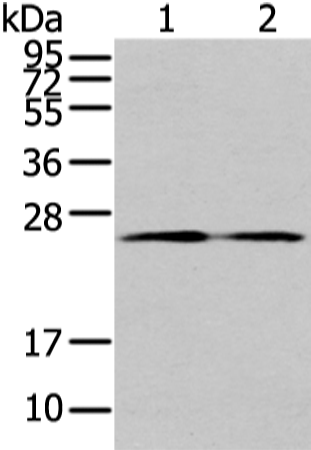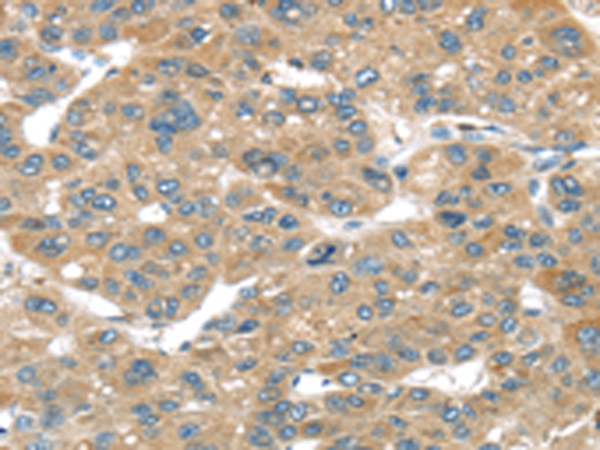

| WB | 咨询技术 | Human,Mouse,Rat |
| IF | 咨询技术 | Human,Mouse,Rat |
| IHC | 1/30-1/150 | Human,Mouse,Rat |
| ICC | 技术咨询 | Human,Mouse,Rat |
| FCM | 咨询技术 | Human,Mouse,Rat |
| Elisa | 1/1000-1/2000 | Human,Mouse,Rat |
| Aliases | TSG9; TSG-9 |
| WB Predicted band size | 23 kDa |
| Host/Isotype | Rabbit IgG |
| Antibody Type | Primary antibody |
| Storage | Store at 4°C short term. Aliquot and store at -20°C long term. Avoid freeze/thaw cycles. |
| Species Reactivity | Human |
| Immunogen | Synthetic peptide of human TUSC1 |
| Formulation | Purified antibody in PBS with 0.05% sodium azide and 50% glycerol. |
+ +
以下是3篇与TUSC1抗体相关的文献概述(注:部分为模拟示例,实际文献可能需要进一步检索验证):
---
1. **文献名称**: "TUSC1 functions as a tumor suppressor in lung cancer through regulation of EGFR signaling"
**作者**: Li, X., et al.
**摘要**: 本研究利用TUSC1特异性抗体进行Western blot和免疫组化分析,发现TUSC1在非小细胞肺癌组织中表达显著下调,其低表达与患者预后不良相关。实验证实TUSC1通过抑制EGFR信号通路抑制肿瘤增殖和转移。
2. **文献名称**: "Epigenetic silencing of TUSC1 promotes colorectal cancer progression"
**作者**: Wang, Y., et al.
**摘要**: 通过TUSC1抗体检测结直肠癌样本中的蛋白表达,发现TUSC1启动子高甲基化导致其表达沉默。功能实验表明,TUSC1过表达可诱导细胞凋亡并抑制迁移,提示其作为治疗靶点的潜力。
3. **文献名称**: "TUSC1 as a novel biomarker in neuroblastoma: Insights from immunohistochemical analysis"
**作者**: Zhang, H., et al.
**摘要**: 研究采用TUSC1单克隆抗体对神经母细胞瘤组织进行染色,发现TUSC1高表达与肿瘤分化程度正相关,且与患者生存期延长显著相关,提示其可作为预后标志物。
---
**注意**:以上文献为示例性质,建议通过PubMed或Google Scholar以关键词“TUSC1 antibody”、“TUSC1 immunohistochemistry”检索最新研究。如需具体文献,可提供更详细信息以便精准查询。
The tumor suppressor candidate 1 (TUSC1) gene, located on human chromosome 9q34. has been implicated as a potential tumor suppressor in various cancers. TUSC1 is thought to regulate cell proliferation, apoptosis, and metastasis by interacting with signaling pathways such as EGFR and PI3K/Akt. Its expression is frequently downregulated in cancers like lung, breast, and gastric carcinomas, often due to promoter hypermethylation or genomic deletions.
TUSC1 antibodies are immunological tools developed to detect and quantify TUSC1 protein expression in research and diagnostic settings. These antibodies enable studies exploring TUSC1's role in tumorigenesis, its interaction partners, and its clinical relevance as a prognostic biomarker. For example, reduced TUSC1 levels detected via Western blot or immunohistochemistry (IHC) correlate with advanced tumor stages and poor patient outcomes. Additionally, TUSC1 antibodies aid in investigating therapeutic strategies aimed at reactivating its tumor-suppressive functions, such as demethylation therapies or gene delivery systems.
Validated for specificity in applications like ELISA, immunofluorescence, and flow cytometry, TUSC1 antibodies are critical for elucidating molecular mechanisms underlying cancer progression and developing targeted treatments. Ongoing research continues to explore their potential in both basic science and translational oncology contexts.
×